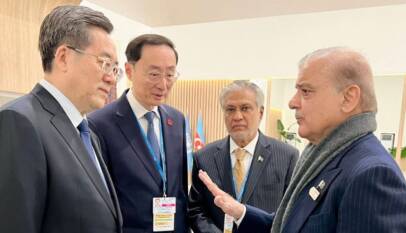Work on CPEC’s Mega ML-1 Project to begin in June
China and Pakistan have signed an addendum to the China-Pakistan Economic Corridor (CPEC) framework agreement, reducing the cost of the Main Line-1 (ML-1) project from $9.85 billion to $6.678 billion. The addendum was signed during the Belt & Road Initiative (BRI) forum and will now title the project “Rationalised Upgradation of ML-1 at 140/120km per hour (Upgradable to 160km per hour).” The project aims to upgrade and modernize railway infrastructure across multiple phases, with construction set to begin by June next year following various administrative steps.
LAHORE: China and Pakistan have signed an addendum to the CPEC’s framework agreement under which the country’s first-ever state-of-the-art mega Main Line-1 (ML-1) project will now be executed with a rationalised cost of $6.678 billion instead of the earlier one of $9.85bn.
The addendum related to the revised ML-1 project was signed by the representatives of the two countries on the sidelines of the recent Belt & Road Initiative (BRI) forum on Oct 17 and 18 which was also attended by the caretaker Prime Minister Anwaarul Haq Kakar.
With the revised cost, the ML-1 project will now be titled “Rationalised Upgradation of Ml-1 at 140/120km per hour (Upgradable to 160km per hour)” instead of the previous one “Upgradation of Ml-1 at 160/120 km per hour” as per approved PC-I, Dawn has learnt.
“It is a matter of great pleasure that the addendum related to the revised ML-1 project and cost has been signed. It happened on the sidelines of the BRI forum held to mark the initiative’s 10 years successful completion,” Zafar Zaman Ranjha, the ML-1 project’s team leader (Pakistan Railways) confirmed while talking to Dawn on Tuesday. “And now, after signing the addendum, there is no issue in the way of executing this project under a revised plan,” Mr Ranjha maintained.
To a question, he said the project consisted of three phases having a total length of 1,726km. Phase-1, 2, 3 and 4 comprise Karachi-Multan, Multan-Lahore, Lahore-Lalamusa and Lalamusa-Peshawar.
The design speed, according to the revised project would be up to 140km per hour which can easily be increased to 160km per hour on the upgraded track once the entire left/right of the track is fenced and some other upgrade work is done completely.
Answering a question, the officer said that since the addendum has been signed, the next steps ahead of the start of the civil work on the project would include hiring a consultant, finalising the amended design by Oct 30, preparing the modified PC-1 and getting it approved by Ecnec, initiating and completing the international bidding process, signing commercial agreements, awarding the contract and releasing funds from Exim Bank (China).
“We are scheduled to start the construction work by June next year,” Mr Ranjha said.
SUPARCO announces lunar mission partnership with China
ISLAMABAD: Pakistan Space and Upper Atmosphere Research Commission (SUPARCO) has announced…












